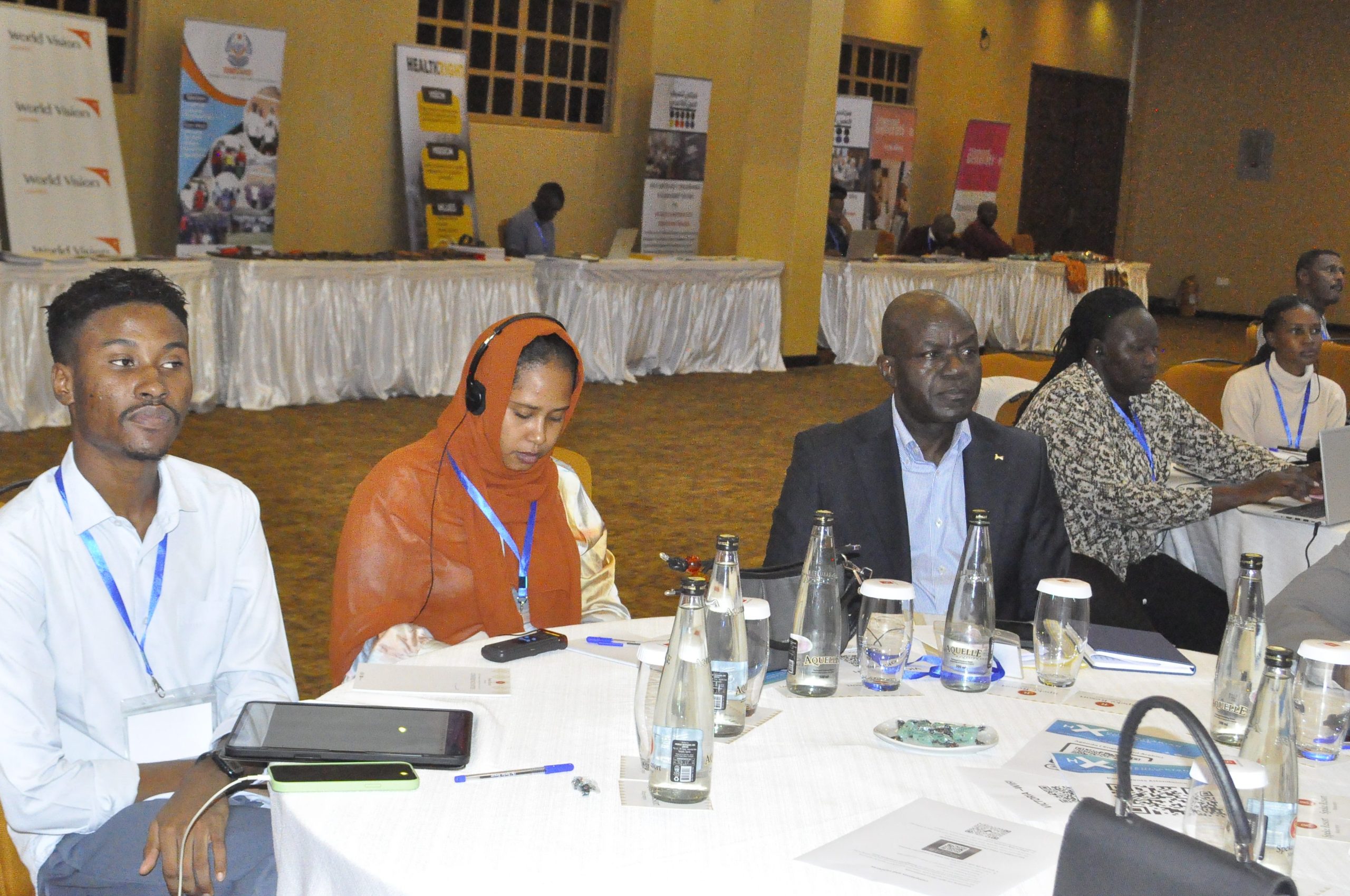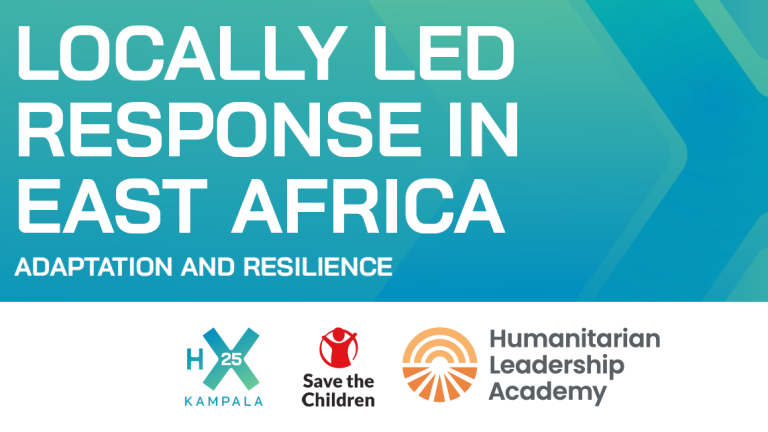This story shines the spotlight a young humanitarian leader – Musaab Abdalhadi, one of many responders who chose to “not stand on the sidelines when conflict began in Sudan”.
Also a Kaya learner, Musaab creates learning for other local responders in addition to coordinating cash voucher assistance in his role at Save the Children International Sudan.

Meeting Musaab
Humanitarian Xchange Kampala focused heavily on the Sudan Response – covering topics of crisis as a catalyst for innovation; coordination; funding and sustainability; safety and security and the role of diaspora – a session Musaab moderated. Some of the key lessons from that session were that:
1. Local responders are essential leaders of the response, not just implementers.
2. Diaspora actors are vital allies, offering financial and moral support, and should be formally included in humanitarian coordination structures.
3. Refugee-led groups are filling life-threatening gaps in services across borders and need visibility, funding, and recognition.
4. Trust-based partnerships and equitable resource sharing are crucial to building a more effective response.
Nwabundo Okoh, HLA Comms and Marketing Specialist interviews Musaab in this piece after collaborating on HLA’s first podcast episode in Arabic with local responders from Sudan.
Let’s hear from Musaab
To every young humanitarian – Your voice matters, your work matters. Do not wait for permission to lead. Learn as much as you can but stay rooted in your values. And remember, your humanity is just as important as your activism.”
We don’t often get these spaces, and I hope this marks a shift toward more meaningful engagement with Sudanese responders.”
We are not here to save, we’re here to serve. Listening to communities rather than assuming what they need, changed everything.”
Interview transcript
Interviewer: Tell us about yourself
Musaab: Thank you. I’m Musaab Abdalhadi, a humanitarian worker from Sudan. I’m currently serving as a CVA cash and voucher assistance coordinator with more focus on the group cash transfer interventions with Save the Children International Sudan Office.
My journey in the humanitarian sector began during the conflict, driven by the urgency to support communities navigating crisis. My work is rooted in amplifying local voices and ensuring affected people lead in shaping their own recovery.
Interviewer: Why did you choose this path, or would you say this path of working as a humanitarian chose you?
Musaab: Okay, that’s great question. Actually, I would say it chose me. I was drawn into humanitarian work by witnessing the deep needs of my community. When the conflict escalated in Sudan I couldn’t stand on the sidelines. It started with a small volunteer actions, but the path unfolded naturally responding to urgent needs, organising with others and eventually leading efforts. It’s never been a great decision. It’s always been about service and responsibility, I would say.
Interviewer: Thank you for sharing. What are some of the biggest lessons you have learned from doing your work as a humanitarian so far in your career.
Musaab: Okay, one of the biggest lessons, I would say, is, that proximity matters. Those closest to the crisis often hold the best solutions. I have also learned that flexibility is the key. We are not here to save, we’re here to serve. Listening to communities rather than assuming what they need, changed everything. Lastly, I have learned that burnout is real, and you must care for yourself to sustain care for others.
Interviewer: How do you balance your work and life to prevent burnout?
Musaab: Musaab of record loves listening to Sudanese music. I would say, Samira Dunia is my lovely Sudanese singer. Reading and spending time with friends definitely, because my family left Sudan. So I do have always, my friends and their family got my back. I also enjoy creating learning content for local responders. It may sound like work, but it’s actually one of the ways I recharge, especially when I know it helps others grow. Also, I work as a life coach who’s passionate about helping people get organised and find their ways.
Interviewer: Let’s talk about HX Kampala and amplifying voices through HLA’s podcast – Fresh Humanitarian Perspectives
Musaab: Okay, let me start with HX Kampala. It’s been inspiring and energising. The discussion at HX Kampala emphasized the importance of shifting power to local actors, something I advocate for strongly. Hearing from peers and being in a space where Sudan challenges are discussed with have been, have been refreshing. We don’t often get these spaces. And I hope this marks a shift toward the more meaningful engagement with Sudanese responders.
In terms of the podcast, ‘Eye on Sudan’, we recorded the 1st episode, and we will be recording the others soon. So the 1st question was about the local responders how they are working on the ground, and how they are coordinating each other to share the resources and their experience. So I’m so excited for this episode and the aim of this episode to amplify their voices and find out how we could engage them in the decision making and shaping the humanitarian response in Sudan.
Interviewer: If you could change one thing, just one thing about the world we currently live. What would that one thing be?
Musaab: I would dismantle systems of inequality that keep people in cycles of crisis, whether it’s unequal access to resources, decision making, or even safety so much suffering stems from preventable injustice.
Interviewer: What is one thing you would like young humanitarians to know?
Musaab: To every young humanitarian – Your voice matters, your work matters. Do not wait for permission to lead. Learn as much as you can but stay rooted in your values. And remember, your humanity is just as important as your activism. Care for yourself, while you care for the world.
Interviewer: What is one thing you would like older generation humanitarians to know?
Musaab: Okay, I would say, please trust us. The younger generation may do things differently, we’re not here to erase your work. We’re here to build on it. Create a space for us, listen without defensiveness and mentor without control. Our collaboration can change everything.
Interviewer: Do you have an encouraging message to humanitarians
Musaab: I would say it’s a time to shift the power to the local community to the local responders who have been doing amazing work on the ground. It’s time to sit together to shape the humanitarian work and give them the chance to participate in the decision-making processes.
Interviewer: Thank you very much for this time spent talking to you.
Musaab: My pleasure.
___________________________
Spotlighting the work of young leaders like Musaab aligns with the HLA’s purpose – to nurture humanitarian leaders – ensuring that local leadership is recognised, resourced, and central to humanitarian response and decision-making.
This interview was recorded at HX Kampala, a conference held with support from Google.org and Center for Disaster Philanthropy.


